Unit2 I’ll help to clean up the city parks. SectionA (1a-2d)课件 (共42张PPT 内嵌音频)
文档属性
| 名称 | Unit2 I’ll help to clean up the city parks. SectionA (1a-2d)课件 (共42张PPT 内嵌音频) | 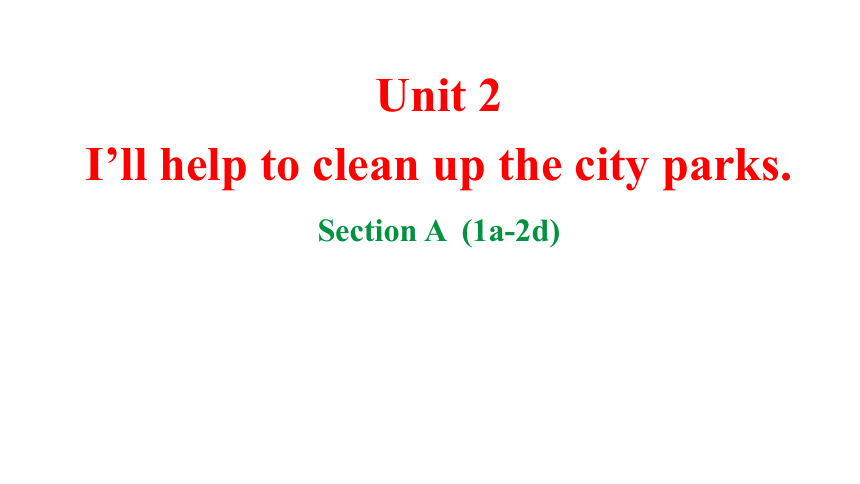 | |
| 格式 | pptx | ||
| 文件大小 | 70.8MB | ||
| 资源类型 | 教案 | ||
| 版本资源 | 人教新目标(Go for it)版 | ||
| 科目 | 英语 | ||
| 更新时间 | 2024-01-25 22:26:16 | ||
图片预览

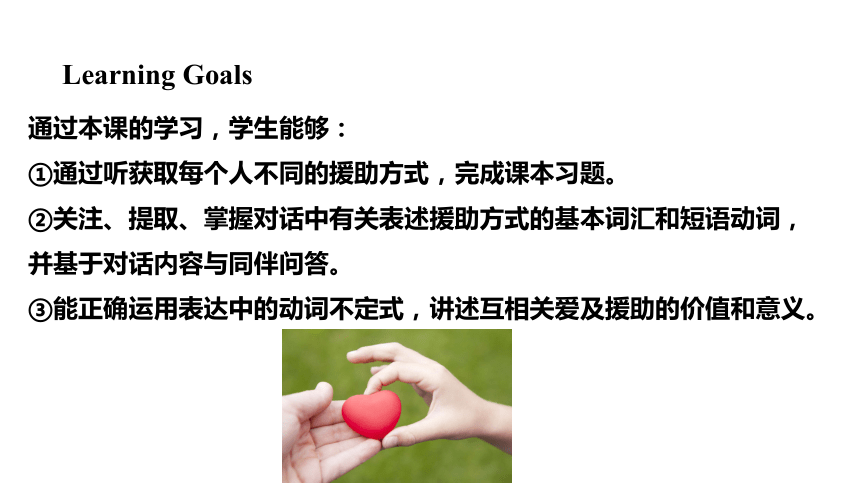
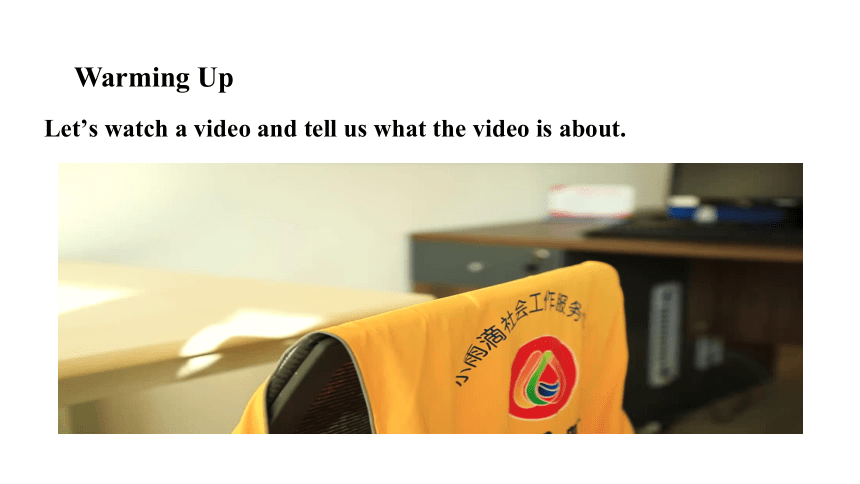

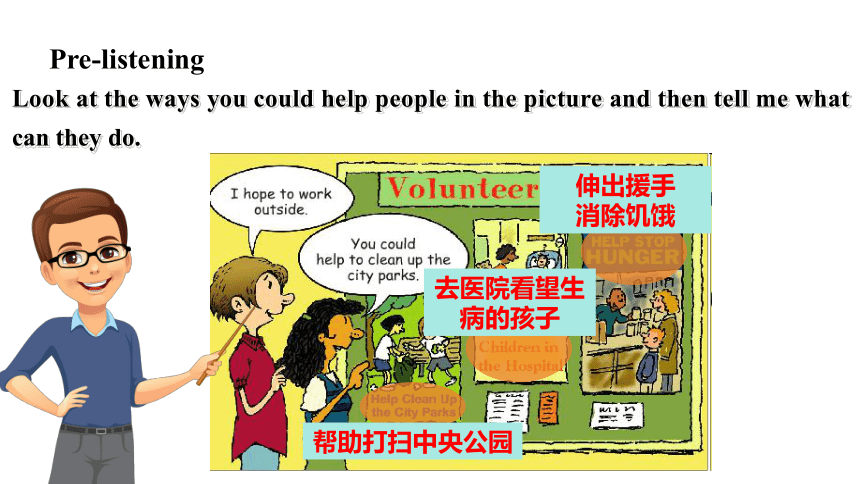
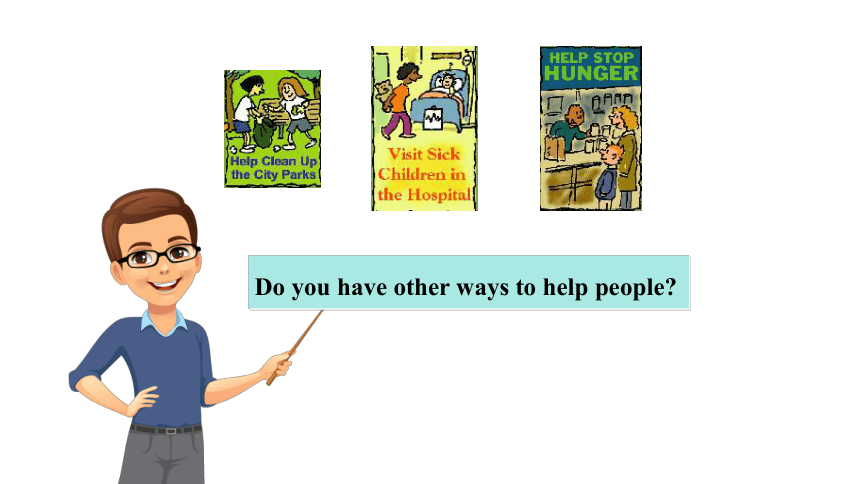
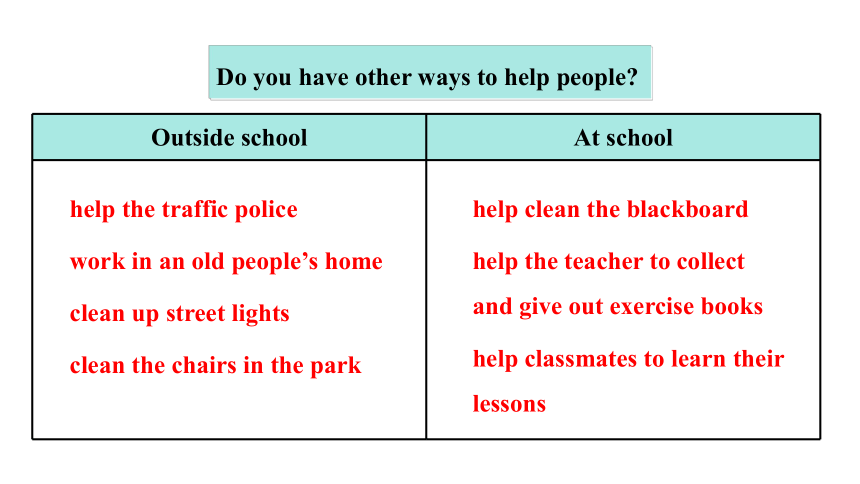
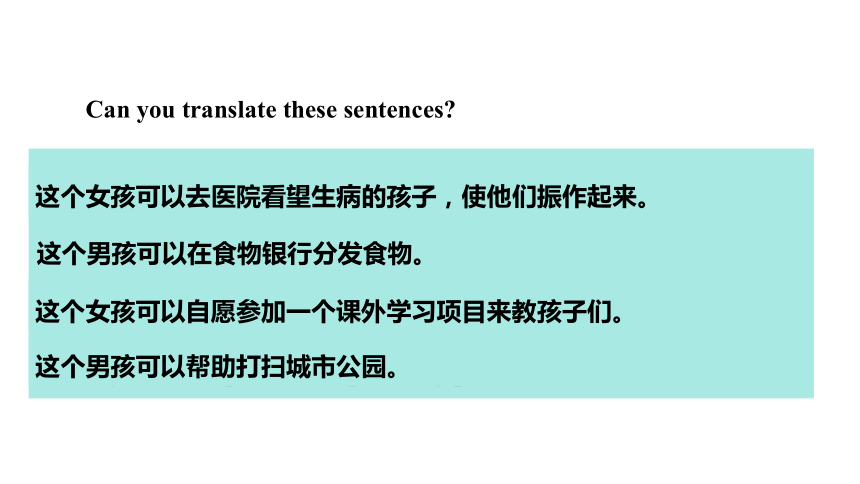
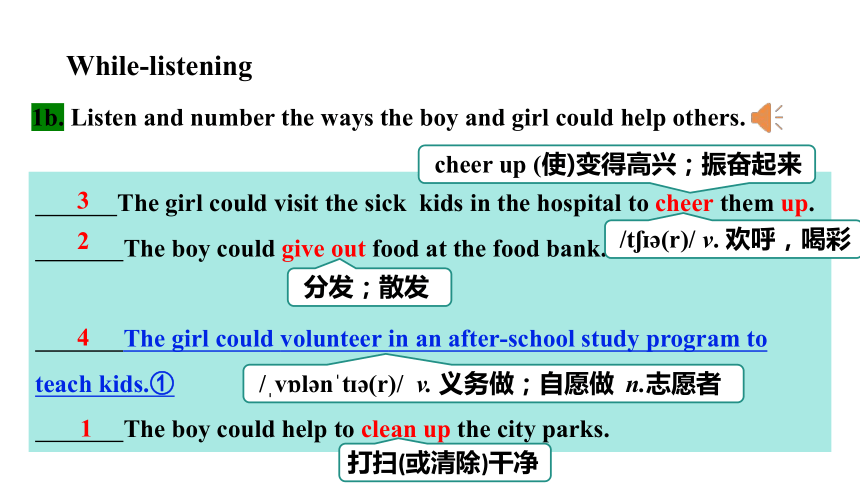
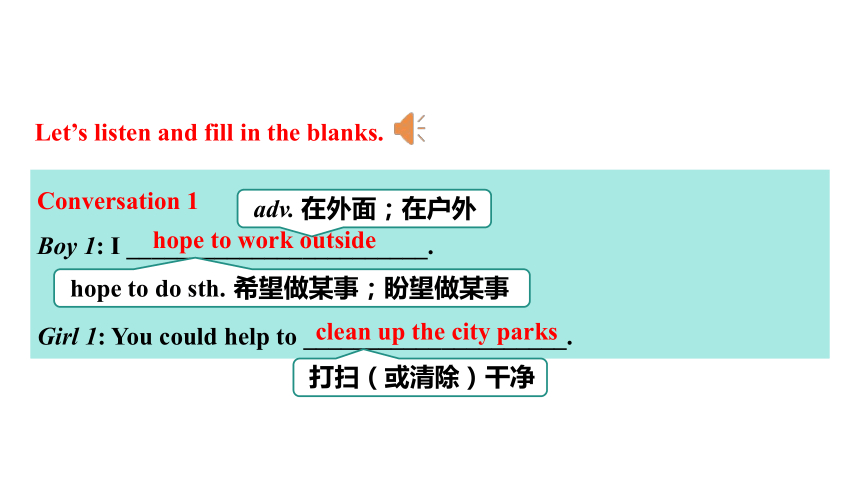
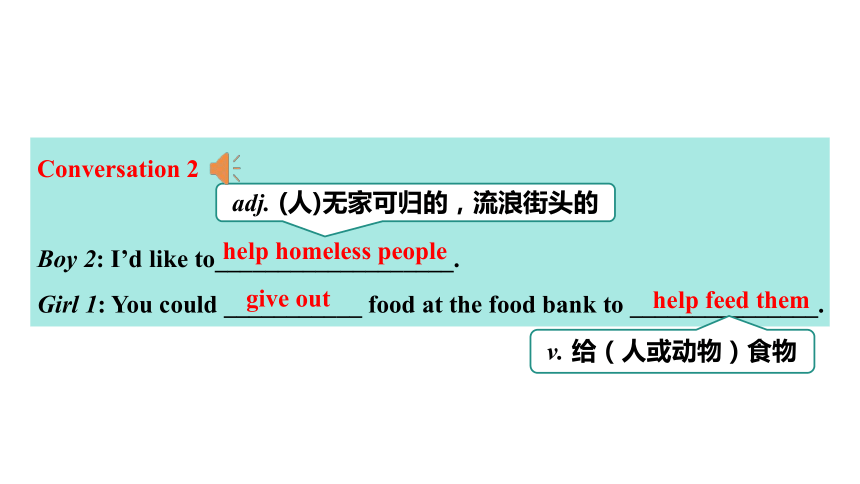
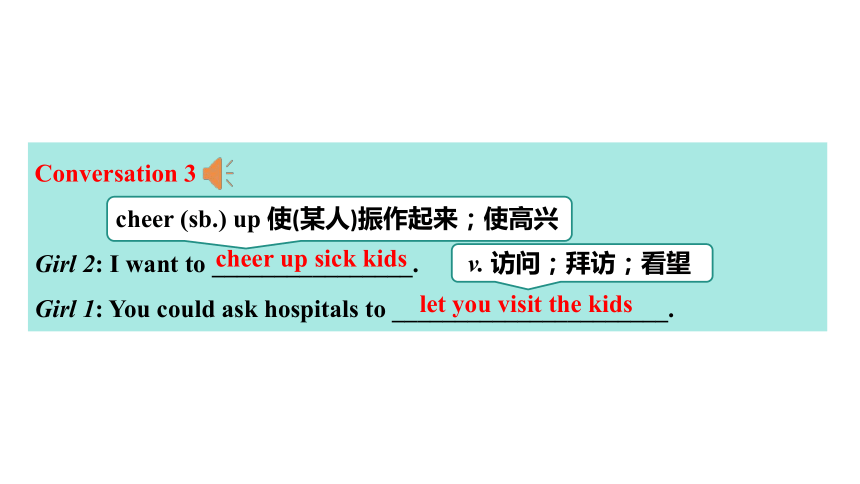
文档简介
(共42张PPT)
Unit 2
I’ll help to clean up the city parks.
Section A (1a-2d)
通过本课的学习,学生能够:
①通过听获取每个人不同的援助方式,完成课本习题。
②关注、提取、掌握对话中有关表述援助方式的基本词汇和短语动词,并基于对话内容与同伴问答。
③能正确运用表达中的动词不定式,讲述互相关爱及援助的价值和意义。
Learning Goals
Warming Up
Let’s watch a video and tell us what the video is about.
Who are they
They’re volunteer.
What are they doing
They help the old man's home keep warm
Look at the ways you could help people in the picture and then tell me what can they do.
Pre-listening
帮助打扫中央公园
去医院看望生病的孩子
伸出援手
消除饥饿
Do you have other ways to help people
Do you have other ways to help people
Outside school At school
help the traffic police
work in an old people’s home
clean up street lights
clean the chairs in the park
help clean the blackboard
help the teacher to collect and give out exercise books
help classmates to learn their lessons
The girl could visit the sick kids in the hospital to cheer them up.
The boy could give out food at the food bank.
The girl could volunteer in an after school study program to teach kids.
The boy could help to clean up the city parks.
Can you translate these sentences
这个女孩可以去医院看望生病的孩子,使他们振作起来。
这个男孩可以在食物银行分发食物。
这个女孩可以自愿参加一个课外学习项目来教孩子们。
这个男孩可以帮助打扫城市公园。
While-listening
1b. Listen and number the ways the boy and girl could help others.
The girl could visit the sick kids in the hospital to cheer them up.
The boy could give out food at the food bank.
The girl could volunteer in an after school study program to teach kids.①
The boy could help to clean up the city parks.
3
2
4
1
cheer up (使)变得高兴;振奋起来
分发;散发
/ v l n t (r)/ v. 义务做;自愿做 n.志愿者
打扫(或清除)干净
/t (r)/ v. 欢呼,喝彩
Let’s listen and fill in the blanks.
Conversation 1
Boy 1: I ________________________.
Girl 1: You could help to _____________________.
hope to do sth. 希望做某事;盼望做某事
adv. 在外面;在户外
打扫(或清除)干净
hope to work outside
clean up the city parks
Conversation 2
Boy 2: I’d like to___________________.
Girl 1: You could ___________ food at the food bank to _______________.
adj. (人)无家可归的,流浪街头的
v. 给(人或动物)食物
help homeless people
give out
help feed them
Conversation 3
Girl 2: I want to ________________.
Girl 1: You could ask hospitals to ______________________.
cheer (sb.) up 使(某人)振作起来;使高兴
v. 访问;拜访;看望
cheer up sick kids
let you visit the kids
Conversation 4
Girl 1:______________________________________.
Girl 2: You could volunteer in an after-school study program to teach
kids.
would like to do sth. 想要做某事 /愿意做某事
I’d like to help kids with their schoolwork
1c. Practice the conversation in the picture above. Then make other conversations using the information in 1b.
Let’s read and translate these phrases.
put up some signs
put an ad on TV
call up friends
在电视上投放一则广告
张贴一些标语
打电话给朋友
/sa n/ n. 标志;信号
打电话给(某人);征召
分发通知
在报纸上登广告
give out notices
put an ad in the newspaper
/ n t s/
n. 通知;通告;注意
v. 注意到;意识到
2a. A group of students are planning a City Park Clean-Up Day. Listen
and check (√) the things they are going to do to tell people about it.
2b. Listen again. Fill in the blanks.
1. We need to ________ ________ ________ a plan to tell people about the
city park clean up.
2. Clean-Up Day is only two weeks from now. We can’t ______ ________
making a plan.
3. We could ________ ________ signs.
4. Let’s make some notices, too. Then I’ll _______ them ______ after
school.
5. We could each ______ ______ 10 students and ask them to come.
come up with
put off
put up
hand out
call up
Let’s listen and fill in the blanks.
Conversation
Boy 1:Now we need to ______________a plan to tell people about the city park clean-up.
Girl 1: Yeah, but I’m hungry, Bob. ___________________.
Girl 2: No, we need to start now. ____________________________________.
Boy 2: You’re right, Sally. We can’t ________________________. As we talk,
I’ll _____________ all our ideas. Then we can _________________________.
come up with
Let’s have lunch first
Clean-up Day is only two weeks from now
put off making a plan
write down
decide which ideas are best
Girl 1: Um…well…we could put up signs.
Boy 2: ___________________!
Girl 2: Let’s make some notices, too. ________________________________.
Boy 1:OK. Great! And we could _____________________ and ask them to come.
Boy 2: Hey, ____________________________________, aren’t we
That’s a good idea
Then I’ll hand them out after school
each call up 10 students
we’re coming up with a lot of good ideas
Let’s listen again and repeat.
Conversation
Boy 1: Now we need to come up with a plan to tell people about the
city park clean-up.
Girl 1: Yeah, but I’m hungry, Bob. Let’s have lunch first.
Girl 2: No, we need to start now. Clean-up Day is only two weeks
from now.
Boy 2: You’re right, Sally. We can’t put off making a plan. As we talk,
I’ll write down all our ideas. Then we can decide which ideas are best.
想出; 提出(注意、计划、回答等)
n.(详细)规划,方案
吃午饭,吃午餐
推迟
制定计划;订计划
写下
n. 想法;构思
v. 对……作出抉择;决定
Girl 1: Um…well…we could put up signs.
Boy 2: That’s a good idea!
Girl 2: Let’s make some notices, too. Then I’ll hand them out
after school.
Boy 1: OK. Great! And we could each call up 10 students and ask
them to come.
Boy 2: Hey, we’re coming up with a lot of good ideas, aren’t we
一个好主意
n. 通告;布告;通知
分发
Let’s read the conversation in 2d and answer the following questions.
1. Where’s Helen going to work this summer
2. What did Tom do in the old people’s home
She’s going to work in an old people’s home.
He read the newspaper and talked to the old people.
3. How do most old people feel
4.Why do Tom and Helen think that they should listen to and care for the old people
They are lonely.
Because a lot of old people are lonely and we’re all going to be old one day, too.
Listen and read the conversation and pay attention to the phrases.
Helen: Hi, Tom. I’m making some plans to work in an old people’s home this summer.
Tom: Really I did that last summer!
Helen: Oh, what did they ask you to help out with
Tom: Mm... things like reading the newspaper to the old people, or just talking to them. They told me stories about the past and how things used to be.
一家养老院
used to... 曾经…… 过去……
看报纸;读报纸
Helen: That sounds interesting.
Tom: Yeah, a lot of old people are lonely.② We should listen to them and
care for them.
Helen: You’re right. I mean, we’re all going to be old one day, too.
许多
照顾;非常喜欢
/ l nli/ adj. 孤单的;寂寞的
Helen: Hi, Tom. I’m making some plans to work in this summer.
Tom: Really I did that last summer!
Helen: Oh,
Tom: Mm... things like to the old people, or just talking to them. They and
.
Disappearing dialogue
an old people’s home
what did they ask you to help out with
reading the newspaper
told me stories about the past
how things used
to be
Helen: That sounds interesting.
Tom: Yeah, . We should and
.
Helen: You’re right. I mean, , too.
listen to them
a lot of old people are lonely
care for them
we’re all going to be old one day
Post-listening
Work in pairs. Make a conversation about volunteer work. You can use the conversation in 2d as model.
帮助做某事 ____________________
(使)变得高兴;振奋起来 _____________________
分发;散发 _____________________
希望做某事;盼望做某事 ______________________
打扫(或清除)干净 _______________________
想要做某事 /愿意做某事 ________________________
提出;想出 ________________________
help to do sth.
Key Phrases
cheer up
give out
hope to do sth.
clean up
would like to do sth.
come up with
吃午饭,吃午餐 __________________
推迟 __________________
制定计划;订计划 __________________
写下 __________________
一个好主意 __________________
分发 __________________
从现在起 __________________
hand out
from now
put off
have lunch
making a plan
write down
a good idea
一家养老院 _______________________
看报纸;读报纸 _______________________
许多 __________________
照顾 __________________
an old people’s home
reading the newspaper
a lot of
care for
1. The girl could volunteer in an after school study program to teach kids.
① volunteer 作动词,意为“自愿做;义务做;无偿做”
volunteer (sth.) (for/as sth.) 自愿(做某事)
e.g. Several staff members volunteered for early retirement.
几位职员自愿提前退休。
Language Points
He volunteered his services as a driver.
他自愿服务充当司机。
volunteer to do sth. 自愿做某事 /志愿做某事
e.g. Many Chinese college students volunteer to be a teacher in the remote and poor areas.
许多中国大学生志愿到边远贫困地区支教。
② volunteer 作名词,意为“义务工作者;志愿者”
e.g. Schools need volunteers to help children to read.
学校需要义务工作者帮助儿童阅读。
Are there any volunteers to help clear up
有自愿帮助清扫的人吗?
Instant Training
1. 做志愿工作使她的生活有了意义。
____________work gives her life a sense
of purpose.
2. 她现在作为一名志愿者每周3天在当地
一所学校帮忙。
She now helps in a local school as
______________ three days a week.
Volunteer
a volunteer
2. Yeah, a lot of old people are lonely.
lonely adj. 孤独的;寂寞的
① alone 既可以作形容词,也可以作副词,“独自的(地)”“单独的(地)”侧重说明独自一人,指客观情况
e.g. She is alone at home. 她独自一人在家。
She lives alone and often feels lonely.
她孑然一身,常感到寂寞。
lonely 与alone的区别:
② lonely 只用作形容词,“孤独的;寂寞的”带有浓厚的感彩
e.g. We never feel lonely in Shanghai.
在上海我们从不感到孤独。
She lives alone and often feels lonely.
她孑然一身,常感到寂寞。
一语辨异
Tom lives alone, but he doesn’t feel lonely.
汤姆独自生活,但他并不感到孤独。
Instant Training
1. 我能看出她很寂寞。
I could see she was _________.
2. 独自一个人锻炼可能会很无聊。
Exercising _________ can be boring.
lonely
alone
Exercises
一、根据句意及汉语提示填空
1. Let’s go to watch the soccer game and c_____ our team.
2. The n______ on the wall says, “No photos”.
3. You can use road s______ to help you find the place.
4. We need a v_________ to help to give out food at the food bank.
5. Old Henry has few friends, so he feels very l_______.
heer
otice
igns
olunteer
onely
二、完成句子
1. 当我沮丧或疲惫时,我喜欢看能让我振奋起来的电影。
When I’m down or tired, I like movies that can______________.
2. 他过去经常睡懒觉,但是现在他习惯早起锻炼。
He______________late, but now he_______________________early for exercise.
3. 趁父母还健在的时候,我们要学会关心他们。
We should learn to________________our parents when they are alive.
cheer me up
used to sleep
is/gets used to getting up
care for/about
1. Key struture:
A: We need to come up with a plan for the City Park Clean-Up Day.
B: Let’s have lunch first.
A: No, we need to start now. Clean-Up Day is only two weeks from now.
2. Key words and expressions:cheer, volunteer, sign, notice, lonely, clean up, cheer up, give out, come up with, put off, hand out, call up, used to, care for
Summary
Unit 2
I’ll help to clean up the city parks.
Section A (1a-2d)
通过本课的学习,学生能够:
①通过听获取每个人不同的援助方式,完成课本习题。
②关注、提取、掌握对话中有关表述援助方式的基本词汇和短语动词,并基于对话内容与同伴问答。
③能正确运用表达中的动词不定式,讲述互相关爱及援助的价值和意义。
Learning Goals
Warming Up
Let’s watch a video and tell us what the video is about.
Who are they
They’re volunteer.
What are they doing
They help the old man's home keep warm
Look at the ways you could help people in the picture and then tell me what can they do.
Pre-listening
帮助打扫中央公园
去医院看望生病的孩子
伸出援手
消除饥饿
Do you have other ways to help people
Do you have other ways to help people
Outside school At school
help the traffic police
work in an old people’s home
clean up street lights
clean the chairs in the park
help clean the blackboard
help the teacher to collect and give out exercise books
help classmates to learn their lessons
The girl could visit the sick kids in the hospital to cheer them up.
The boy could give out food at the food bank.
The girl could volunteer in an after school study program to teach kids.
The boy could help to clean up the city parks.
Can you translate these sentences
这个女孩可以去医院看望生病的孩子,使他们振作起来。
这个男孩可以在食物银行分发食物。
这个女孩可以自愿参加一个课外学习项目来教孩子们。
这个男孩可以帮助打扫城市公园。
While-listening
1b. Listen and number the ways the boy and girl could help others.
The girl could visit the sick kids in the hospital to cheer them up.
The boy could give out food at the food bank.
The girl could volunteer in an after school study program to teach kids.①
The boy could help to clean up the city parks.
3
2
4
1
cheer up (使)变得高兴;振奋起来
分发;散发
/ v l n t (r)/ v. 义务做;自愿做 n.志愿者
打扫(或清除)干净
/t (r)/ v. 欢呼,喝彩
Let’s listen and fill in the blanks.
Conversation 1
Boy 1: I ________________________.
Girl 1: You could help to _____________________.
hope to do sth. 希望做某事;盼望做某事
adv. 在外面;在户外
打扫(或清除)干净
hope to work outside
clean up the city parks
Conversation 2
Boy 2: I’d like to___________________.
Girl 1: You could ___________ food at the food bank to _______________.
adj. (人)无家可归的,流浪街头的
v. 给(人或动物)食物
help homeless people
give out
help feed them
Conversation 3
Girl 2: I want to ________________.
Girl 1: You could ask hospitals to ______________________.
cheer (sb.) up 使(某人)振作起来;使高兴
v. 访问;拜访;看望
cheer up sick kids
let you visit the kids
Conversation 4
Girl 1:______________________________________.
Girl 2: You could volunteer in an after-school study program to teach
kids.
would like to do sth. 想要做某事 /愿意做某事
I’d like to help kids with their schoolwork
1c. Practice the conversation in the picture above. Then make other conversations using the information in 1b.
Let’s read and translate these phrases.
put up some signs
put an ad on TV
call up friends
在电视上投放一则广告
张贴一些标语
打电话给朋友
/sa n/ n. 标志;信号
打电话给(某人);征召
分发通知
在报纸上登广告
give out notices
put an ad in the newspaper
/ n t s/
n. 通知;通告;注意
v. 注意到;意识到
2a. A group of students are planning a City Park Clean-Up Day. Listen
and check (√) the things they are going to do to tell people about it.
2b. Listen again. Fill in the blanks.
1. We need to ________ ________ ________ a plan to tell people about the
city park clean up.
2. Clean-Up Day is only two weeks from now. We can’t ______ ________
making a plan.
3. We could ________ ________ signs.
4. Let’s make some notices, too. Then I’ll _______ them ______ after
school.
5. We could each ______ ______ 10 students and ask them to come.
come up with
put off
put up
hand out
call up
Let’s listen and fill in the blanks.
Conversation
Boy 1:Now we need to ______________a plan to tell people about the city park clean-up.
Girl 1: Yeah, but I’m hungry, Bob. ___________________.
Girl 2: No, we need to start now. ____________________________________.
Boy 2: You’re right, Sally. We can’t ________________________. As we talk,
I’ll _____________ all our ideas. Then we can _________________________.
come up with
Let’s have lunch first
Clean-up Day is only two weeks from now
put off making a plan
write down
decide which ideas are best
Girl 1: Um…well…we could put up signs.
Boy 2: ___________________!
Girl 2: Let’s make some notices, too. ________________________________.
Boy 1:OK. Great! And we could _____________________ and ask them to come.
Boy 2: Hey, ____________________________________, aren’t we
That’s a good idea
Then I’ll hand them out after school
each call up 10 students
we’re coming up with a lot of good ideas
Let’s listen again and repeat.
Conversation
Boy 1: Now we need to come up with a plan to tell people about the
city park clean-up.
Girl 1: Yeah, but I’m hungry, Bob. Let’s have lunch first.
Girl 2: No, we need to start now. Clean-up Day is only two weeks
from now.
Boy 2: You’re right, Sally. We can’t put off making a plan. As we talk,
I’ll write down all our ideas. Then we can decide which ideas are best.
想出; 提出(注意、计划、回答等)
n.(详细)规划,方案
吃午饭,吃午餐
推迟
制定计划;订计划
写下
n. 想法;构思
v. 对……作出抉择;决定
Girl 1: Um…well…we could put up signs.
Boy 2: That’s a good idea!
Girl 2: Let’s make some notices, too. Then I’ll hand them out
after school.
Boy 1: OK. Great! And we could each call up 10 students and ask
them to come.
Boy 2: Hey, we’re coming up with a lot of good ideas, aren’t we
一个好主意
n. 通告;布告;通知
分发
Let’s read the conversation in 2d and answer the following questions.
1. Where’s Helen going to work this summer
2. What did Tom do in the old people’s home
She’s going to work in an old people’s home.
He read the newspaper and talked to the old people.
3. How do most old people feel
4.Why do Tom and Helen think that they should listen to and care for the old people
They are lonely.
Because a lot of old people are lonely and we’re all going to be old one day, too.
Listen and read the conversation and pay attention to the phrases.
Helen: Hi, Tom. I’m making some plans to work in an old people’s home this summer.
Tom: Really I did that last summer!
Helen: Oh, what did they ask you to help out with
Tom: Mm... things like reading the newspaper to the old people, or just talking to them. They told me stories about the past and how things used to be.
一家养老院
used to... 曾经…… 过去……
看报纸;读报纸
Helen: That sounds interesting.
Tom: Yeah, a lot of old people are lonely.② We should listen to them and
care for them.
Helen: You’re right. I mean, we’re all going to be old one day, too.
许多
照顾;非常喜欢
/ l nli/ adj. 孤单的;寂寞的
Helen: Hi, Tom. I’m making some plans to work in this summer.
Tom: Really I did that last summer!
Helen: Oh,
Tom: Mm... things like to the old people, or just talking to them. They and
.
Disappearing dialogue
an old people’s home
what did they ask you to help out with
reading the newspaper
told me stories about the past
how things used
to be
Helen: That sounds interesting.
Tom: Yeah, . We should and
.
Helen: You’re right. I mean, , too.
listen to them
a lot of old people are lonely
care for them
we’re all going to be old one day
Post-listening
Work in pairs. Make a conversation about volunteer work. You can use the conversation in 2d as model.
帮助做某事 ____________________
(使)变得高兴;振奋起来 _____________________
分发;散发 _____________________
希望做某事;盼望做某事 ______________________
打扫(或清除)干净 _______________________
想要做某事 /愿意做某事 ________________________
提出;想出 ________________________
help to do sth.
Key Phrases
cheer up
give out
hope to do sth.
clean up
would like to do sth.
come up with
吃午饭,吃午餐 __________________
推迟 __________________
制定计划;订计划 __________________
写下 __________________
一个好主意 __________________
分发 __________________
从现在起 __________________
hand out
from now
put off
have lunch
making a plan
write down
a good idea
一家养老院 _______________________
看报纸;读报纸 _______________________
许多 __________________
照顾 __________________
an old people’s home
reading the newspaper
a lot of
care for
1. The girl could volunteer in an after school study program to teach kids.
① volunteer 作动词,意为“自愿做;义务做;无偿做”
volunteer (sth.) (for/as sth.) 自愿(做某事)
e.g. Several staff members volunteered for early retirement.
几位职员自愿提前退休。
Language Points
He volunteered his services as a driver.
他自愿服务充当司机。
volunteer to do sth. 自愿做某事 /志愿做某事
e.g. Many Chinese college students volunteer to be a teacher in the remote and poor areas.
许多中国大学生志愿到边远贫困地区支教。
② volunteer 作名词,意为“义务工作者;志愿者”
e.g. Schools need volunteers to help children to read.
学校需要义务工作者帮助儿童阅读。
Are there any volunteers to help clear up
有自愿帮助清扫的人吗?
Instant Training
1. 做志愿工作使她的生活有了意义。
____________work gives her life a sense
of purpose.
2. 她现在作为一名志愿者每周3天在当地
一所学校帮忙。
She now helps in a local school as
______________ three days a week.
Volunteer
a volunteer
2. Yeah, a lot of old people are lonely.
lonely adj. 孤独的;寂寞的
① alone 既可以作形容词,也可以作副词,“独自的(地)”“单独的(地)”侧重说明独自一人,指客观情况
e.g. She is alone at home. 她独自一人在家。
She lives alone and often feels lonely.
她孑然一身,常感到寂寞。
lonely 与alone的区别:
② lonely 只用作形容词,“孤独的;寂寞的”带有浓厚的感彩
e.g. We never feel lonely in Shanghai.
在上海我们从不感到孤独。
She lives alone and often feels lonely.
她孑然一身,常感到寂寞。
一语辨异
Tom lives alone, but he doesn’t feel lonely.
汤姆独自生活,但他并不感到孤独。
Instant Training
1. 我能看出她很寂寞。
I could see she was _________.
2. 独自一个人锻炼可能会很无聊。
Exercising _________ can be boring.
lonely
alone
Exercises
一、根据句意及汉语提示填空
1. Let’s go to watch the soccer game and c_____ our team.
2. The n______ on the wall says, “No photos”.
3. You can use road s______ to help you find the place.
4. We need a v_________ to help to give out food at the food bank.
5. Old Henry has few friends, so he feels very l_______.
heer
otice
igns
olunteer
onely
二、完成句子
1. 当我沮丧或疲惫时,我喜欢看能让我振奋起来的电影。
When I’m down or tired, I like movies that can______________.
2. 他过去经常睡懒觉,但是现在他习惯早起锻炼。
He______________late, but now he_______________________early for exercise.
3. 趁父母还健在的时候,我们要学会关心他们。
We should learn to________________our parents when they are alive.
cheer me up
used to sleep
is/gets used to getting up
care for/about
1. Key struture:
A: We need to come up with a plan for the City Park Clean-Up Day.
B: Let’s have lunch first.
A: No, we need to start now. Clean-Up Day is only two weeks from now.
2. Key words and expressions:cheer, volunteer, sign, notice, lonely, clean up, cheer up, give out, come up with, put off, hand out, call up, used to, care for
Summary
同课章节目录
- Unit 1 What's the matter?
- Section A
- Section B
- Unit 2 I'll help to clean up the city parks.
- Section A
- Section B
- Unit 3 Could you please clean your room?
- Section A
- Section B
- Unit 4 Why don't you talk to your parents?
- Section A
- Section B
- Unit 5 What were you doing when the rainstorm came
- Section A
- Section B
- Review of Units 1-5
- Unit 6 An old man tried to move the mountains.
- Section A
- Section B
- Unit 7 What's the highest mountain in the world?
- Section A
- Section B
- Unit 8 Have you read Treasure Island yet?
- Section A
- Section B
- Unit 9 Have you ever been to a museum?
- Section A
- Section B
- Unit 10 I've had this bike for three years.
- Section A
- Section B
